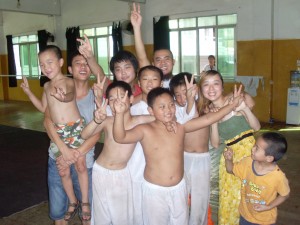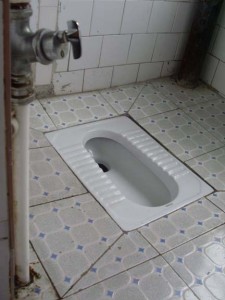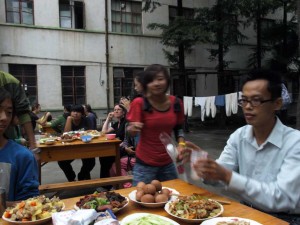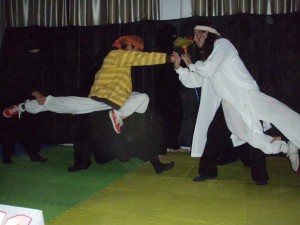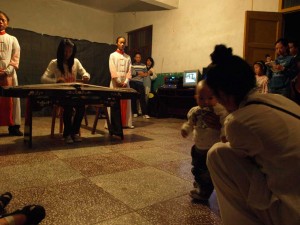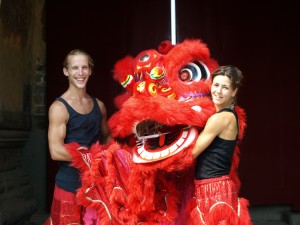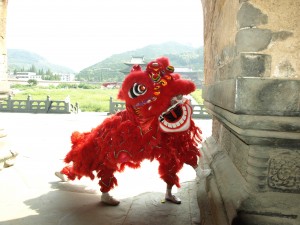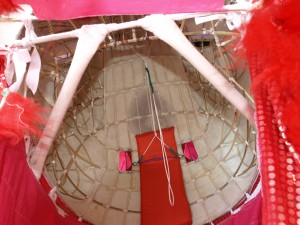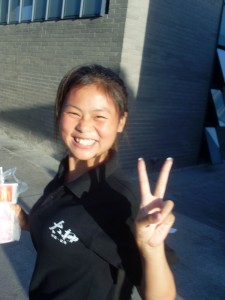 I never thought much about the word hello before I came to live in China almost 7 years ago. It was a greeting, but really not even a very natural one – I was more inclined to say “Hey,” or “Hi,” “Yo” sometimes, or even a good “Whatsup?” But China has made me conscious of many things I had previously taken for granted, and one of them is, Hello.
I never thought much about the word hello before I came to live in China almost 7 years ago. It was a greeting, but really not even a very natural one – I was more inclined to say “Hey,” or “Hi,” “Yo” sometimes, or even a good “Whatsup?” But China has made me conscious of many things I had previously taken for granted, and one of them is, Hello.
Wikipedia suggests that the word derives from old Old English, German, or French words, meaning more or less, “whoa there!” and used as an exclamation of surprise or for hailing. The usage of the word was shaped and proliferated through Thomas Edison when hello was widely adopted as a telephone greeting. Wherever the word started, I can’t imagine I’d be far wrong in guessing that it is now the most widely recognized English word in the world – there is no doubt in my mind that this is so in China, at any rate.
However, hello has gone a bit astray in transit to China from its native countries. Wikipedia lists hullo, halloo, hallo, hollo, and even hillo as variants and relatives of the word hello, and all of these and myriad others are back in circulation here as people from a thousand Chinese dialects attempt to tackle English phonetic sounds.
Further, the function of the hello in China has fragmented into several distinct usages. First and most obvious, the word is used as it is used by native speakers, as a greeting. Among people who have studied English more extensively or have been exposed more regularly to western customs, hello is a sincere and friendly acknowledgement of meeting and perhaps the initiation of a conversation in Chinese, English, or the ever-popular and practical Chinglish.
The second popular usage of the word is, rather unfortunately, in the function better reserved for “Excuse me”: that is, gracefully and politely getting the attention of a stranger or someone whose attention is otherwise engaged. For lack of fluency in English or initiation into our customs, I fear many sincere and well intentioned Chinese people make a poor first impression by seeming intrusive or forward with a loud “HELLO!” as their first overture to a westerner in the street.
The third (and to me most offensive) usage is as a metaphorical sharp stick for poking. Tall, blond-haired, blue-eyed, pale skinned westerners like myself are certainly a rarity, not to say and oddity, in China. There are an unfortunate number of people who are not content to merely witness this rarity walk by, but feel the need to provoke some reaction. The formula for accomplishing this seems to be to wait until I have walked past them several steps, and then shout “HULLOO” as loud as they can, and see what I will do. It always reminds me of an impatient child at the zoo, who wants to see the sleeping lions do something, now!
When I encounter these three hellos, I do my best to welcome the first, forgive the second, and ignore the last. But these have been 7 long years and my patience is not always what it should be, and I am sure I have ignored or snapped at more than one sincere and friendly Chinese person, and made a spectacle of myself for more than one ignorant individual I should have just ignored.
And I can say with fair certainty that my classmates have had similar experiences, because an effective (but no doubt strange-seeming, to an outsider) coping mechanism has developed among us, and yet another usage of the hello is born. Is hello used offensively or excessively? Then we will use it more offensively, more excessively. We whisper it to each other on the way to training. We shout it at one another in the halls of our dormitory. The more oddly pronounced, strangely accented, the better. Roommates bat the word back and forth like a ping pong ball, sometimes louder, sometimes softer, with every variation in cadence and emphasis. heeello. HEllo. helLO! HELLLLLLO! The word has lost meaning for us. We are inoculated against it. It is our word. It has become the word you can say when there is nothing else to be said.
So if we ever meet, you might hear me say “Hi,” or “Hey, I’m Corey,” or even “Wazzup?” But don’t think me too strange if, at some point when silence falls over the conversation, I give a little twitch of a smile and say, “halloo.”

